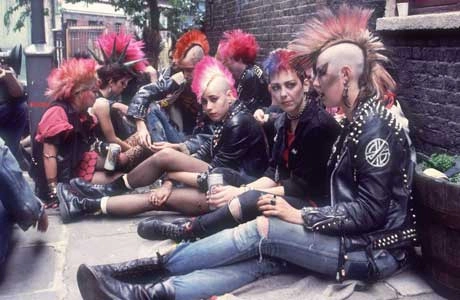There is a current surge of interest in punk. The Sex Pistols’ God Save the Queen topped the UK singles charts during the Platinum Jubilee. This was 45 years to the day after it controversially didn’t when originally released at the time of the Silver Jubilee.
Famed director Danny Boyle has also turned his hand to dramatising the life of the band in his series Pistol, which traces the evolution of the Sex Pistols and the UK punk rock movement that grew out of London in the 1970s. The series, based on the autobiography of Pistols guitarist Steve Jones, has been the subject of controversy, including legal battles with former Sex Pistols’ frontman John Lydon who tried to prevent the use of their music. The lead singer dubbed the show: “the most disrespectful shit I ever had to endure”.
Almost all genres in popular music have subcultural connotations, signifying style in clothes and moral values. But arguably no other genre has stronger subcultural currency than punk. Musician and lead singer of the band Talking Heads, David Byrne said that “punk was defined by an attitude rather than a musical style”. So what did it mean to be punk?
Unlike “prog” and “glam” rock before it, punk was anti-establishment, anti-mainstream and anti-commercial. It came to be in the early to mid-1970s when music had become less accessible, and to the next generation of audience, less relatable. This happened to coincide with a period of economic decline and growing social unrest. It was a time when the youth of the day felt like their future was fairly bleak.
Breaking through the high-brow attitude and elitism was central to the punk attitude. The names of early British punk bands, such as the Clash, the Stranglers and the Damned, served as statements of both belligerence and provocation.
The Damned’s New Rose was considered to be one of the first UK punk records, released in October 1976. The track was comprised of aggressive energetic drumming (played by the curiously named Rat Scabies), raw distorted, riffing rhythm guitar (switching on occasions to lead parts), underpinned by the bass guitarist attacking the root notes of the guitar chords. Chord sequences were simple and sometimes jarring by way of less obvious progressions. Vocals were sitting somewhere between being sung, spoken and shouted.
Thematically, punk lyrics were often antagonistic, challenging society’s “norms”. Songs like Anarchy in the UK (1976) by the Sex Pistols, gave voice to a young generation that felt disenfranchised by its own country.
Punk was never limiting and was not subject to gender bias in the way preceding types of rock music were. Many females were active contributors and participants, of particular note were Susan Ballion aka Siouxsie Sioux, who fronted the iconic punk group Siouxsie and the Banshees, and style icon Pamela Rooke aka Jordan (the Queen of Punk).
It is worth noting that across the Atlantic there was also a burgeoning punk scene that preceded the UK punk movement. New York’s CBGB club, opened by Hilly Kristal in 1973, provided a place for the scene to crystallise. The Ramones, Televisionm The Voidoids, Blondie, the Patti Smith Group and Talking Heads all played early gigs there, going on to achieve prominence.
Music journalist John Robb, who was also a vocalist in the punk rock band Goldblade and bassist and vocalist in the post-punk band the Membranes opined:
It is impossible to define punk. It is subjective and means something different to everyone… [it is] exciting, confusing, exhilarating, an unpinned grenade, intellectual but not academic, revolutionary. It tore a hole in the fabric of pop culture and we all got through.
Punk was multifaceted and was many things to many people. Something that was felt, enabling, empowering, contradictory, manifesting through individual and collective expression, but perhaps to understand what it was in the beginning, you had to be there.
The musician Peter Hook’s origin story is firmly rooted in punk, in particular a Sex Pistols concert at the Lesser Free Trade Hall in Manchester in June 1976. It was reported to have been attended by around only 40 people, but many of them went on to become culturally important figures in British music. It was this event that inspired Hook the next day to buy a bass guitar and hatch a plan to form a band. He would become a founding member of Joy Division, which became New Order after the death of singer Ian Curtis.
For dance music pioneer and co-founder of 808 State, Graham Massey, one of his first bands was the punk group Danny and the Dressmakers. He has described how he was denied access to music education at school:
“With the spirit of rebellion, I entered music around the time of punk where no musical ability was required. There was a great spirit of just jumping in and making a noise.”
The fact that musical training and virtuosity were not required meant that punk was not confined to musical elites and deep-pocketed institutions as it had largely been in the past. Massey also talked about “the creative thrill” of “reinvention” in the wake of the dismantling of the musical establishment.
The DIY spirit was very much part of the movement. Punks created fanzines, bands created their own labels and people made their own clothes as a form of cultural expression. Manchester band, The Buzzcocks and their manager Richard Boon created New Hormones, the first independent punk rock label in the UK. They were also responsible for organising the Sex Pistols’ Manchester gig attended by Hook, and others.
From the late 1970s, punk lost its initial cultural impetus and fragmented (as is always the case with musical and cultural waves), into such styles as anarcho-punk, street-punk and gothic-punk. These movements subsequently gave rise to further new movements (including the new wave). However, the very term “punk” lives on used to describe nonconformity and subversion.





















